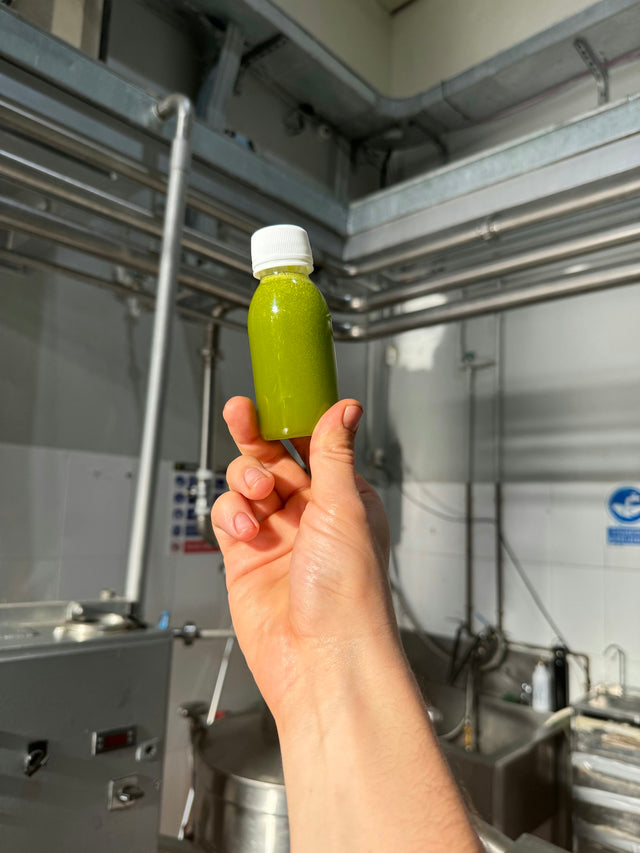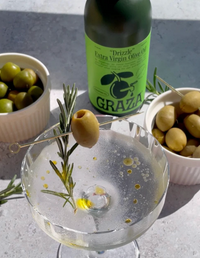
Ask A Nutritionist: Olive Oil FAQs
Selena Ayala comes from a 15 year career in the fashion industry as an editorial, runway, and commercial model. This experience led her to witness firsthand the damaging effects of body shaming, ageism, and mental health challenges, including eating disorders.
Motivated by these experiences, Selena trained in clinical nutrition. A member of the National Association of Nutrition Practitioners, Selena's education also includes studies with a Yerberos, an herbalist in Oaxaca, Mexico. Today, she is dedicated to advancing the understanding of integrative nutrition and body literacy, empowering women to thrive in their bodies at every stage of life.
What are the main health benefits of using olive oil in cooking?
One interesting and fun fact I share with my client's research on olive oil is that this fruit oil is pressed from the flesh of the olives, not the seeds. I believe that emphasizing the oil being extracted from the flesh highlights its gentle and delicate nature. I feel fortunate to have this insight.
Additionally, there are three primary therapeutic functions of olive oil that I consider essential, reinforcing my belief that olive oil is indeed a therapeutic oil.
Blood Sugar Control
Olive oil can help improve insulin sensitivity and regulate blood sugar levels, which is beneficial for managing or reducing the risk of type 2 diabetes.
Digestive Health
Olive oil has mild laxative properties, supporting healthy digestion and relieving constipation. It may also promote a healthy gut microbiome.
Skin
Olive oil contains antioxidants and has anti-inflammatory properties. Consuming olive oil can contribute to healthy skin by reducing damage from oxidative stress, potentially slowing down skin aging.
Also, utilizing olive oil in cooking olive oil has a relatively high smoke point (especially light or refined versions), making it suitable for sautéing, roasting, and even some light frying. For optimal health benefits, it's recommended to use extra virgin olive oil for low to medium-heat cooking or as a dressing.
Is Extra Virgin Olive Oil Nutritionally Different from Other Types of Olive Oil?
Extra virgin olive oil is typically extracted using cold press technology. The cold press extraction retains the the nutrient content and bioactive compounds such as Polyphenols, Vitamin E, Monounsaturated fats-MUFAs. MUFAs, particularly oleic acid, help reduce "bad" LDL cholesterol levels while raising "good" HDL cholesterol. This can lower the risk of atherosclerosis and cardiovascular events. In digestive health, cold-pressed olive oil can promote healthy digestion by stimulating the production of bile, which helps digest fats.
What Should I Look for When Choosing a High-Quality Olive Oil?
First, I suggest paying attention to the harvest date, not just the expiration date or best-by date. Olive oil is best consumed fresh (within 12-18 months of harvest), so the closer you are to the harvest date, the better the flavor and nutritional value. Also, I would consider storage. Once purchased, store your olive oil in a cool, dark place to maintain its quality. Light, heat, and air can degrade olive oil over time, so proper storage is essential.
What Should I Avoid When Shopping for Olive Oil?
Avoid olive oil in transparent glass bottles.
Can Olive Oil Contribute to Heart Health, and if so, How?
Correct, it can contribute to heart health; I encourage the perspective to take a comprehensive perspective. Let’s imagine your body is like a big team working together, and the healthy fats called MUFAs are special helpers on that team.
Heart health: MUFAs help keep your heart strong by lowering the bad cholesterol (LDL) and raising the good cholesterol (HDL). It’s like cleaning out the pipes in your body so your blood can flow easily, helping to prevent heart disease. Energy and fullness: Foods with MUFAs, like avocados, olive oil, and nuts, give you long-lasting energy and help you feel fuller, which can stop you from overeating and snacking on junk food.
Brain function: Your brain loves healthy fats. MUFAs help improve memory, focus, and even mood, keeping your mind sharp. Fights inflammation: MUFAs have anti-inflammatory properties, meaning they help your body recover from stress, injury, or illness, making you feel better.
How Can I Use Olive Oil in my Overall Wellness Routine?
I suggest making it a primary everyday oil alongside other MUFA oil. Remember the sugar campaign in the late ’60s, where the Weight Watchers slogan advertised "A spoonful of sugar for prevention?" Sugar helps prevent you from overeating. I want to rebrand this to "A spoonful of EVOO" for prevention. While it may not sound as sexy as sugar, I encourage you to give it a try and observe the results for yourself. I encourage my clients to establish an essential routine, as it helps them understand how their bodies work and how different foods affect them.

















